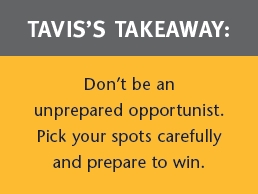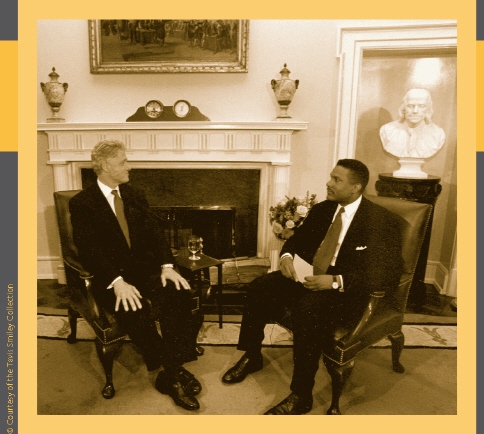Fail Up (23 page)

The short end of the story is that after my first week, I was asked to come back again and again for 12 straight weeks. Finally my agent said to BET, “Enough. Either do the deal or not.”
It did the deal.
In my five years with BET, “Tavis Smiley” became a household name with Black folk.
Trust me; your moment will come. And if you're prepared, you'll instinctively grasp the opportunity. And don't be afraid to go first.
Three Keys to Success
This story also addresses another concernâthe need to reject perceptions of our limitations. I was a public policy major with a failed political campaign on my résumé. I had no training in radio or TV.
It mattered little.
So many of us let perceptions of our limitations hold us back. Yet there are countless examples that should encourage us to dream outside our self-imposed boundaries.
By his own account, Abraham Lincoln didn't have what passed for a formal education. What he did have was a voracious appetite for books and for learning what he wasn't taught in school. Lincoln's intellectual power blazed an unpaved path to the White House.
Albert Einstein maintained that his parents were convinced that he was “retarded” because he didn't utter a word until he was three years old. Odd in youth perhaps, but the physicist, philosopher, and Nobel Laureate was not to be denied his role as a preeminent genius.
Winston Churchill was the British prime minister whose great oratory skills inspired a devastated nation during World War II. It has been written that young Churchill suffered benign parental neglect, had a speech impediment as a child, and grappled with what he defined as “the black dog” of depression. Despite his challenges, when he died in 1965, he was lionized as an honored world leader.
In his book
Outliers
, author Malcolm Gladwell unravels the secrets of extremely successful peopleâthose “whose achievements fall outside normal experience.” Chapter two dissects “The 10,000-Hour Rule.” Basically, Gladwell projects that high IQs, innate talent, and training at elite institutions are not what determine one's success. Hours of practiceâin fact, 10,000 hours of practiceâare the amount of time researchers noted that separated the “masters” like Mozart, Bill Gates, and the Beatles from equally gifted composers, computer programmers, and musicians.
In other words, preparationânot standard educationâis that extra “something” that catapults the likes of Albert Einstein, Thomas Edison, Steven Spielberg, Miles Davis, and Abraham Lincoln to fame.
Trust that inner voice, and let no thoughts of your limitations or so-called missed opportunities deter you. Focus on following the magic 10,000-hour rule. Practice and prepare without fear of failure.
In other words, get ready to be ready.
Let me close by sharing the inspiring words inscribed on the wall in the office of the late, great civil rights attorney, Johnnie Cochran:
“There are only three keys to success:
Preparation. Preparation. Preparation.”


“We have no permanent friends,
no permanent enemies,
only permanent interests.”
F
or years on the
Tom Joyner Morning Show
, I borrowed this phraseâadapted and adopted by the Congressional Black Caucus (CBC)âas one of my guiding philosophies. The fight for jobs, education, housing, and civil rights required strategic partnerships with legislatorsâfriends or foesâwho had to cooperate if we were to accomplish our goals.
I thought more Black folk could get where they needed to go politically and socially if they adopted this slogan.
However, after really contemplating the formulation, particularly the compromised underlying message “⦠just permanent interests” part, I became unsettled by its troubling implication.
My friend and confidante, Dr. Cornel West, was the one who originally pulled my coat and nudged me in that direction. In our conversation, he expressed flat-out disdain for the slogan. The idea that an individual or group's “interests” supersedes its “principles” troubled him greatly.
“In other words, as long as your interests are served, you'll work with anybody,” Doc reasoned. “Well, what happens when your interests are antithetical to or in tension with your principles? What if your best interests betray your core truths?”
The power versus truth dynamic isn't unlike the interests versus principles dynamic. How often do we sacrifice “truth and principles” for “power and personal interests”? Doc always encourages each of us to take our own inventory. When you define and actually see your principles and values in action, it's very difficult to align yourself with individuals or situations that betray your basic beliefs.
For example, too many folks attend a particular churchâknowing that the minister is a money-hungry, philandering charlatanâjust because it's a popular gathering place in the community. When pressed, some hip-hop artists admit they are opposed to the violence and near-pornography they promote in their music videos. That they gain fame and fortune from their work is an impotent exchange for compromising their values.
President Obama and the Democratic Party disappointed many of their staunch supporters when they compromised on health-care reform just to appease non-appeasable Republicans. The President still didn't pick up a single Republican vote in the Senate.
The larger point is that in each of our lives, we will be confronted with decisions that challenge our core principles. Will we choose to be “truth-tellers” or “power-grabbers”?
It's important to surround yourself with friends and associates who intellectually challenge you. There I was, accepting the precept that it's okay to swap principles for what suits our best interests until a good friend said: “Hold up, let's rethink this.”
Indeed, rethinking it brought back the memory of a preeminent “truth-teller” who paid the ultimate price for solidly standing by his principles, even under tremendous fire.
Dethroning a King
When Dr. King was murdered on the balcony of the Lorraine Motel in Memphis, Tennessee, all the evidence indicates that he departed this life believing almost everybody had turned against him.
His last two years were hell on earth. He was acceptable when he stayed within the confines of his approved roleâwaging the nonviolent battle for Black rights. But when he spoke out against the Vietnam War, the White House turned against him, as did leaders of the NAACP, Urban League, and other advocacy organizations. Carl Rowan and other Black writers joined their white colleagues in the denunciation of this servant-leader. His Morehouse classmates denounced him; he couldn't even get a book deal. Invitations to speak publicly declined; he was even disinvited from community speaking engagements and church-related events.
The last Harris Poll before Dr. King's death indicated that almost three-quarters of the American people had turned against him. Also at that time, more than half of all Black people opposed his stance on the Vietnam War.
Meanwhile, the Nation of Islam under Malcolm X and the Black Panther Party led by Huey P. Newton preached fiery messages of retribution that challenged the turn-the-other-cheek, nonviolent crowd. Many young Black people considered Dr. King soft, an Uncle Tom, or an antiquated relic of an increasingly irrelevant movement. The Black bourgeoisie, who feared the Baptist minister would damage their relationships with the President, were like: “Martin, what the heck are you doing?”
Let's be clear, Dr. King believed Lyndon B. Johnson was the best President of his time. The 1964 and 1965 Civil and Voting Rights Acts couldn't have been enacted without him. His admiration aside, however, Dr. King would not abandon his principlesânot even to appease the most powerful man in the land and “friend of the Negro people.”
This was Dr. King's standing in America when he was assassinated on April 4, 1968. The majority of whites and large numbers of bourgeois, revolutionary, and apolitical Negroes had turned against him, and he had been booted off the “most admired Americans” list.
The servant-leader, by all accounts, was persona non grata.
Now, decades later, it's generally acknowledged that the Vietnam War was the low point in the history of American military excursions. Retrospective truth, after ridicule, isolation, and personal suffering, finally validated Dr. King's principled stance.
Principles Over Personality
It's no secret that President Bill Clinton and I are friends. When he was in office and I was on BET, he granted me more interviews than anyone else in the mediaâBlack or white. It was clear that I had unusual access to the Clinton administration. We flew around the world together. I even traveled to Africa with him, but I was never naïve about our relationship. When he wanted to deliver a message to his Black base, his staff contacted me. There were no pretenses. He needed access to my Black audience, and I, like any other broadcaster, valued access to the White House.
Although I considered Clinton a candid straight shooter, I was also aware that the President had adopted a centrist approach for political gain. This, I've always maintained, fed his tendency to sometimes compromise too much. In spite of our mutual interests, if he disagreed with something I said, he'd let me know without getting petulant or punitive about it. We'd discuss our differences and, if necessary, would agree to respectfully disagree.
During the 1992 presidential election, then Governor Clinton sandbagged the Rev. Jesse Jackson at a Rainbow PUSH event. The candidate chose to publicly repudiate hip-hop artist and political activist Sister Souljah for controversial remarks she had made. As far as I was concerned, Clinton used Jackson's forum to let potential white voters know that he wouldn't tolerate radical Negro-ism. And that's basically what I said on the radio.
Our disagreements continued after President Clinton entered the White House. I was absolutely livid in the mid-1990s when he signed the blatantly racist 100-to-1 crack/powder cocaine crime bill with little modification. Something is fundamentally wrong with a justice system that insists on mandatory sentences for the possession of 5 grams of crack cocaine but allows folk caught with 500 grams of powdered cocaine to get off on probation.
When Clinton used poor people as pawns, signing sweeping, regressive, welfare reform proposals just to out-conservative conservatives, I took him to task. And with so many other issuesâwhen he caved to conservative criticism and withdrew his nomination of scholar and civil rights activist Lani Guinier to be Assistant Attorney General for Civil Rights; when he dragged his feet on the Rwanda genocide crisis; and other issues affecting the poor and oppressedâI checked Bill Clinton with a vengeance.
Not to just beat up on Clinton: I also clashed with Al Gore, John Kerry, other prominent Democrats, a whole bunch of Republicans, and several Black notables. You might have noticed a familiar complaint that rises in my criticisms of presidential candidates and their parties over the years.
During a segment of CNN's
Talk Back Live
in 2000, I took presidential candidate Gore and his party to task about the way he and it kept Black voters on the low-priority shelf:
“This is real simple: The Democrats cannot win without the Black voteâperiod, end of sentence. Which is one of the reasons why it is so troubling ⦠we have not seen the kind of time, it seems to me, (that) should be spent discussing and dissecting issues that are important, not just to the Black vote, but indeed to people of color ⦠which sends a message that is less than acceptable ⦠The problem is that the Democrats still too often take the Black vote for granted, and the Republicans completely ignore us.”
In a forum we arranged for leading GOP presidential candidates in 2007 at Morgan State University, Arizona Sen. John McCain, former Massachusetts governor Mitt Romney, and former New York City Mayor Rudy Giuliani declined to participate. I felt their decision deserved redress:
